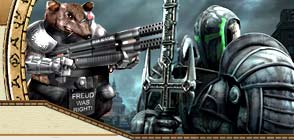 Русский язык в иноязычных произведениях, примеры ошибок Русский язык в иноязычных произведениях, примеры ошибок |
Здравствуйте, гость ( Вход | Регистрация )
 23.11.2004 - 00:47 23.11.2004 - 00:47
Сообщение
#1
|
|
|
???????? ???????    Группа: Житель Сообщений: 170 Регистрация: 13.10.2004 Пользователь №: 994 |
начну с цитаты из статьи Павла Вязникова "Его звали Пауль":
QUOTE Еще один момент, к которому читатели, знакомые с предыдущими переводами "Дюны", могли привыкнуть - нелепые строки "древнего похоронного ритуала", которые произносит на оплакивании Джамиса Стилгар: "Има трава около, и коренья около". Сие в переводе должно означать:"Вот пепел, и вот корни". Читатель недоумевает, а дело в том, что автор, желая изобразить "древний язык", пользуется словарем русского языка (который он явно не знает). Hелепое "около" - перевод английского "here is/are..." - что значит, действительно, "вот". С другой стороны,. то же "here" можно перевести и как "около", и надо полагать, что это округлое, распевное слово чисто фонетически пришлось Герберту по душе. Вероятно, аналогичная история произошла и с "корнями" - увидев в словаре, что "roots" можно перевести как "корни" и "коренья", автор выбрал второй вариант как более подходящий по размеру и звучанию, оставшись при этом в неведении относительно разницы между корнями и тем, что кладут в суп - кореньями, всякой петрушкой и сельдереем. "Трава" же - результат явной ошибки, ну, а "има" вставлено просто для благозвучия... Чтобы стих не звучал так нелепо, мне и пришлось перевести его на хиндустани - у Герберта, естественно, этого нет. признаюсь, когда встретилась с этим первый раз, насторожил меня этот фрагмент, в том смысле, что поостереглась принимать его прямо на веру. А вспомнила я этот фрагмент вот почему: недавно взялась-таки за "The hunt for Red October" по-английски. Должна признать, что тщательность изображения всего, что связано с Советским Союзом, и вообще умение войти в чужую шкуру (т.е. менталитет, конечно) меня впечатлило. Чего стоит хотя бы фраза, в которой агент КГБ думает о враче-мормоне: "While waiting for instructions from Moscow, Petchkin had checked up on Tait and found him to be, though a religious fanatic, an efficient and honorable physician, one of the best in government service." Но столкнулась я и с одной интересной ошибкой. Цитирую оригинал: The timer dinged again, and Petrov lifted the rack a second time, shaking it and setting it in the water-filled basin. Another boring job completed. Why couldn't a sailor fall down a ladder and break something? He wanted to use his East German X-ray machine on a live patient. He didn't trust the Germans, Marxists or not, but they did make good medical equipment, including his X-ray, autoclave, and most of his pharmaceuticals. Time. Petrov lifted the rack and held it up against the X-ray reading plate, which he switched on. "Nichevo!" Petrov breathed. He had to think. His badge was fogged. Its number was 3-4-8: third badge series, frame fifty-four (the medical office, galley section), aft (officers') accommodations. Конечно, должно быть "Ничего себе!". Пропущено одно слово, и получается не возглас удивления, а этакое отмахивающееся: "Ничего! Сойдет!". Тем более забавно это звучит в таком фрагменте (агент КГБ сидит в палате возле советского моряка и как раз собирается закурить. проходящий мимо доктор это видит): "Oh, God!" Tait raced around the corner and shot through the swinging door. Petchkin's look of surprise changed to amazement as the doctor batted a cigarette and lighter from his hand, then to outrage as he was lifted from his chair and flung towards the door. Tait was the smaller of the two, but his sudden burst of energy was sufficient to eject the man from the room. "Security!" Tait screamed. "What is the meaning of this?" Petchkin demanded. Tait was holding him in a bearhug. Immediately he heard feet racing down the hall from the lobby. "What is it, sir?" A breathless marine lance corporal with a .45 Colt in his right hand skidded to a halt on the tile floor. "This man just tried to kill my patient!" "What!" Petchkin's face was crimson. "Corporal, your post is now at that door. If this man tries to get into that room, you will stop him any way you have to. Understood?" "Aye aye, sir!" the corporal looked at the Russian. "Sir, would you please step away from the door?" "What is the meaning of this outrage!" "Sir, you will step away from the door, right now." The marine bolstered his pistol. "What is going on here?" It was Ivanov, who had sense enough to ask this question in a quiet voice from ten feet away. "Doctor, do you want your sailor to survive or not?" Tait asked, trying to calm himself. "What — of course we wish him to survive. How can you ask this?" "Then why did Comrade Petchkin just try to kill him?" "I did not do such a thing!" Petchkin shouted. "What did he do, exactly?" Ivanov asked. Before Tait could answer, Petchkin spoke rapidly in Russian, then switched to English. "I was reaching for a smoke, that is all. I have no weapon. I wish to kill no one. I only wish to have a cigarette." "We have No Smoking signs all over the floor, except in the lobby — you didn't see them? You were in a room in intensive care, with a patient on hundred-percent oxygen, the air and bedclothes saturated with oxygen, and you were going to flick your goddamned Bic!" The doctor rarely used profanity. "Oh sure, you'd get burned some, and it would look like an accident — and that kid would be dead! I know what you are, Petchkin, and I don't think you're that stupid. Get off my floor!" The nurse, who had been watching this, went into the patient's room. She came back out with a pack of cigarettes, two loose ones, a plastic butane lighter, and a curious look on her face. Petchkin was ashen. "Dr. Tait, I assure you that I had no such intention. What are you saying would happen?" "Comrade Petchkin," Ivanov said slowly in English, "there would be an explosion and fire. You cannot have a flame near oxygen." "Nichevo!" Petchkin finally realized what he had done. He had waited for the nurse to leave — medical people never let you smoke when you ask. He didn't know the first thing about hospitals, and as a KGB agent he was accustomed to doing whatever he wanted. (...) Действительно, "Ничего!" Кто-нибудь столкнулся с подобными моментами? |
|
|
|
Сообщений в этой теме
 corrector Русский язык в иноязычных произведениях 23.11.2004 - 00:47
corrector Русский язык в иноязычных произведениях 23.11.2004 - 00:47
 Vezir У меня мало чисто языковых ляпов, но зато много пр... 12.05.2005 - 20:54
Vezir У меня мало чисто языковых ляпов, но зато много пр... 12.05.2005 - 20:54  |
1 чел. читают эту тему (гостей: 1, скрытых пользователей: 0)
Пользователей: 0
| Текстовая версия | Сейчас: 19.09.2025 - 05:29 |











